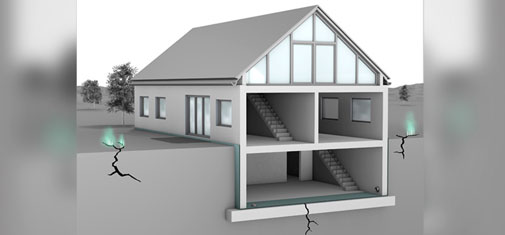-

新聞發佈
MC-Proof eco
隔絕氡氣的最佳利器氡氣存在於世界各地,除非有無法滲透的屏障。不然氡氣會在土壤中以不同濃度產生,並滲透於建築物內部,該氣體已被證實為誘發肺癌的因素之一。因此,防止該氣體進入民眾的生活空間至關重要。 MC 無瀝青反應型密封劑 MC-Proof eco(以前稱為Expert Proof eco)具有高裂紋橋接效能,並在最近的一項測試中獲得有效隔絕氡氣的認證。
MC-Proof eco 隔絕氡氣的最佳利器
2020/05/27
氡氣存在於世界各地,除非有無法滲透的屏障。不然氡氣會在土壤中以不同濃度產生,並滲透於建築物內部,該放射性氣體已被證實為誘發肺癌的因素之一。因此,防止該氣體進入民眾的生活空間至關重要。我們的無瀝青反應型密封劑 MC-Proof eco(以前稱為Expert Proof eco)具有高裂紋橋接效能,並在最近的一項測試中獲得有效隔絕氡氣的認證。
A previously underestimated risk
The particular danger with radon lies in the fact that the gas is colourless, odourless and tasteless and is therefore imperceptible. Radon concentrations can only be determined with special instruments in the hands of experts. The result of the decay of uranium and radium, this once underestimated gas has been present in the depths of the earth for millions of years and, depending on the permeability of the soil, can rise to the surface. Once in the open air, the gas is quickly diluted and rendered harmless. However, it can enter buildings through leaky foundation floor slabs, cracks in masonry or through cable and pipe penetrations to accumulate in the interior air. Radon concentrations are at their highest in cellars, basements or ground-floor rooms with no basement, thereafter decreasing from floor to floor. According to the Federal German Office for Radiation Protection (BfS - Bundesamt für Strahlenschutz), the annual average value of radon concentration in living spaces in Germany, for example, is about 50 Bq/m3. Around five to ten percent of homes in Germany have values of over 100 Bq/m3 in their living spaces and about 0.04 percent have values of over 1,000 Bq/m3.
Preventing radon ingress
Together with the Federal German Ministry for the Environment, the BfS has developed a concept comprising protective measures designed to reduce radiation exposure to radon in living and recreational interiors. Germany’s new Radiation Protection Act states that building owners in areas with high radon exposure are required to implement effective sealing measures to prevent or significantly impede the ingress of radon from the foundation soil. Such steps are mandatory where the annual average value of
100 Bq/m3 is exceeded. New buildings have to be provided with a continuous barrier throughout to prevent the penetration not only of ground damp but also that of radon, while leaks in existing buildings need to be identified and eliminated.
Reactive sealant MC-Proof eco provides protection against radon
MC-Proof eco, the fast-hardening, highly flexible and bitumen-free reactive barrier sealant from MC-Bauchemie, is not only suitable for waterproofing cellars, basements and rooms in contact with the ground against damp and water ingress, but also against radon – as has been confirmed by a certification test carried out in accordance with Technical Specification ISO/TS 11665-13 (Measurement of radioactivity in the environment - Air: radon 222 - Part 13: Determination of the diffusion coefficient in waterproof materials: membrane two-side activity concentration test method; 2017). The measurements were performed with instruments calibrated by the BfS. The test confirmed that a 4 mm thick coating with MC-Proof eco is sufficient to ensure radon tightness. The test certificate was issued in January 2020 and is valid for five years.
Reliable proofing
MC-Bauchemie's structural sealant can be applied without primer on vertical, horizontal and inclined surfaces in cellars or basements, and on floor slabs, foundations and similar. The two-component reactive coating is also suitable as a waterproofing membrane in the transition to water-impermeable components and as a base level moisture barrier in splash water areas or for fixing protection and drainage boards. In addition to its impermeability to water and radon, it is also carbonation-retarding and resistant to de-icing salts to EN 13687-2:2002-05. MC-Proof eco is easy to apply and can be both painted and plastered over.

© MC-Bauchemie 2026
